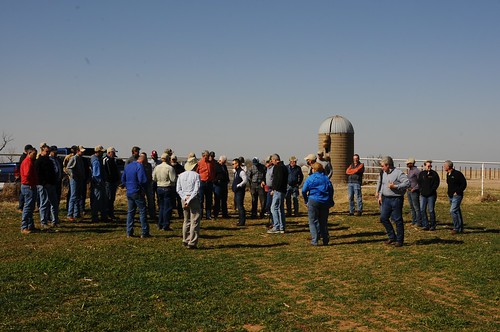
All this month we will be taking a look at what a changing climate means to Agriculture. The ten regional USDA Climate Hubs were established to synthesize and translate climate science and research into easily understood products and tools that land managers can use to make climate-informed decisions. The Hubs work at the regional level with an extensive network of trusted USDA agency partners, technical service providers, University collaborators, and private sector advisers to ensure they have the information they need to respond to producers that are dealing with the effects of a variable climate. USDA's Climate Hubs are part of our broad commitment to developing the next generation of climate solutions, so that our agricultural leaders have the modern technologies and tools they need to adapt and succeed in the face of a changing climate.
The Southern Great Plains has historically posed a challenge to farming and ranching. Extended drought, late season freezes and excessive rainfall are facts of life in Texas, Oklahoma and Kansas. With continued climate change, the likelihood is growing that extreme weather conditions will have even more of an effect on the country’s ability to produce food and fiber as we move into the future. It’s paramount the nation’s farmers and ranchers are given tools to develop strategies to help weather the storms and maintain the productivity and profitability necessary to stay on the land.
The USDA Southern Plains Climate Hub (Hub), along with USDA’s Natural Resources Conservation Service (NRCS) and Agricultural Research Service (ARS), Redlands Community College, the region’s Agricultural Universities and other partners have been working to develop best management practices designed to help ag producers adapt to intense weather events through improving soil health. This includes the establishment of demonstration farms that implement soil health practices such as no-till, cover cropping and better pasture management. As a result of conducting field days and soil health seminars associated with these demonstration efforts, the Hub and its partners are providing real world examples of how implementing these soil health practices can help agriculture “harden” itself to extreme drought, volatile temperature swings and heavy rain events.
In February of 2016, the Southern Plains Hub in partnership with Redlands Community College (RCC) in El Reno, Oklahoma, held its first Central Oklahoma Soil Health field day at the RCC Darlington Agriculture Center. More than 100 agriculture producers, students and agriculture professionals heard nationally-recognized speakers discuss the importance of improving soil health to both maintain productivity and improve profits. Tours were conducted of tests plots where experts from NRCS and the Samuel Roberts Noble Foundation discussed different farming practices and their ability to help producers retain moisture and control erosion. A second seminar in March drew the same interest as was in February. The outgrowth is partnerships are under discussion for implementation in West Texas and Southwest Oklahoma. Other efforts are underway in all three of the southern plains states, as well as potential partnerships with the regions various Native American tribes.
Through these efforts, the Hub and its partners hope to dramatically increase the number of no-till crop production acres, cover crop acres and pasture acres utilizing soil health principles in the region. These practices can help increase farmers’ and ranchers’ soil health and organic matter, thereby increasing the water holding capacity of their grounds. They also can greatly reduce soil erosion, reduce fuel use, sequester carbon in the soil and improve fertilizer efficiency—all efforts that not only help “harden” agriculture to extreme weather, but helps fight climate change while protecting our water.
There are no silver bullets in the battle against climate change. However, by helping farmers and ranchers improve the health of the soil, the Southern Plains Climate Hub believes it is at least giving them a fighting chance to deal with the extreme conditions climate change exacerbates.




